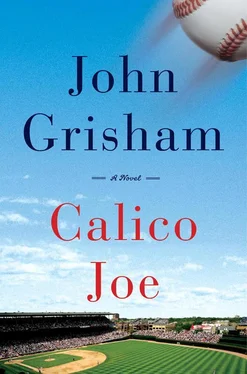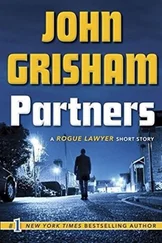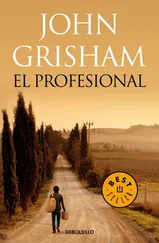He tipped his cap and helmet to the crowd, then took a lead off first.
His twelfth at bat came in the bottom of the sixth with the Cubs up 3–2. When the forty-one thousand faithful stood to applaud, they remained standing. On television, Curt Gowdy admitted to having a knot in his stomach. On the radio, Vince Lloyd described it as the most dramatic moment he could remember. Lou Boudreau went silent.
Hiller had abandoned his fastball altogether and was surviving on long, looping curves, changeups, and a nasty combo of a slider and curve known as a slurve. Joe fouled off the first two pitches, both balls, and cursed himself for swinging at bad pitches. He shortened his stance, choked up, and took a ball high. The fourth pitch was a slow, dropping curve, a pitch that might cross the plate at the knees or six inches lower, and Joe took no chances. He chopped down on the pitch, and it slammed hard into home plate—a fair ball. It ricocheted high into the air toward third, where Goodson charged and waited, and waited. When he finally caught the ball, Joe was past first base for his twelfth consecutive hit. Move over Moose Dropo.
Again, he tipped his hat to the screaming crowd. Willie McCovey, a fierce competitor, tapped him on the rear with his glove and said, “Congratulations, kid.” Joe could only smile and nod. He was dreaming and in another world. Not too many years earlier, his baseball card collection included a double “All-Star” selection featuring both Willie McCovey and Willie Mays.
In the top of the eighth, McCovey hit a two-run bomb that sailed over the right field bleachers and was probably never found. The Giants led 5–3 when the Cubs came to bat in the bottom of the inning.
The score was one thing, but the majority of the fans were not there just to watch a ball game. It was a rare moment to celebrate. Their beloved Cubs had not won a World Series since 1908. There had been some memorable moments—the 1945 team lost the Series in seven games to Detroit—though this had been during the “war years,” when the good players were serving in the armed forces. There had been a few Hall of Famers—Hack Wilson in the 1920s and Ernie Banks in the 1950s and 1960s. Generally speaking, though, Cubs fans were accustomed to disappointment. They were fiercely loyal, but also desperate for a team or a player that was better than the rest.
Joe’s thirteenth at bat had enough pressure because of the first twelve hits, but add a runner at each base, two outs, and two runs down, and the tension on the field was suffocating. The crowd was standing, yelling, some were even praying. Hiller was gone, replaced by a right-hander named Bobby Lund, a veteran reliever who threw exceptionally hard. Joe would later admit that he preferred to hit from the left side because he could pick up the fastballs a bit quicker. He was always content to foul off pitches and work the count full, but in this, his thirteenth and possibly most important at bat in whatever career he might eventually have, he decided to be impatient. He took the first pitch, a high fastball, and after one look at Lund’s delivery, he was ready. The second pitch was another fastball, maybe an inch outside, but close enough to rip. Joe hit a scorcher to right center, a bullet that Tito Fuentes at second actually leaped for and missed badly. The ball stayed ten feet off the ground until it crashed into the ivy, where Bobby Bonds played it on one hop and fired home. With two outs, the runners were off with contact, and Joe’s double cleared the bases.
When he slid unchallenged into second base, he owned the record, the one that had been labeled “unbreakable.” Standing on second, he put his hands on his knees and stared at the dirt and for a few seconds tried to believe and savor the moment. The stadium was manic; the noise was earsplitting.
The Giants catcher, Dave Rader, had the ball and, when the dust settled, called time. Slowly, he walked past the mound to second base, where he ceremoniously handed it to Joe Castle. The crowd roared even louder with this memorable act of sportsmanship.
Joe removed his helmet and acknowledged the adulation. The umpires were in no hurry to resume play. They were witnessing history, and the game is played without a clock. Finally, Joe walked to the seats beside the Cubs dugout and tossed the ball to his father. Then he went back to second base and put on his helmet. He looked deep into center field and quickly wiped a tear from his cheek. A camera caught it, and Curt Gowdy and Tony Kubek made sure the world saw that Joe Castle, standing alone on second base and alone in the record book, now a legend, was human enough to show emotion.
5

After an hour on the flat, two-lane highways of northeastern Arkansas, I realize I am quite hungry. Outside the town of Parkin, I pull in to the gravel lot of a barbecue shack and hope for the best. To avoid potential conversation, I take a portion of my scrapbook to read during lunch. Over a pulled pork sandwich and a root beer, I flip through pages of press clippings I have not seen in decades.
As soon as Joe arrived in the majors, I began visiting the library in White Plains to collect stories from the Chicago newspapers. Using a massive Xerox machine near the periodicals section, I made copies at five cents each. The July 15 Sunday editions of both the Sun-Times and the Tribune were packed with stories and photos of Saturday’s historic game. Joe was interviewed at length about the game, and it was obvious he was thoroughly enjoying the moment. Among many memorable quotes, he said such things as:
“Well, if they keep me in the lineup, I’ll probably hit .750 for the season.”
And, “Oh, sure, we have seventy-four games left. One home run per game is not out of the question.”
And, “They’ll get me out eventually.”
And, “The pennant? That’s already in the bag, man. We’re thinking about the World Series. I want to play the A’s.”
In spite of these comments, it was clear he liked bantering with the press and much of what he said was tongue-in-cheek. The Chicago baseball reporters, a notoriously tough bunch, were in awe and described him as “cocky but not the least bit arrogant” and “at times obviously overwhelmed by what he had done.” His teammates were stunned but also realistic. One said, “He’ll cool off, but let’s hope it takes a few weeks. Right now we’ve won four in a row, and that’s all that matters.” Whitey Lockman, when asked if Joe would remain in the lineup, retorted, “What, are you crazy?”
The postgame photos revealed a fresh-faced kid who looked all of twenty-one and was on top of the world. He was handsome, with deep-set blue eyes and curly, sandy hair, the kinds of looks that would soon attract women everywhere he went. He was single and had no significant female in his life, according to one story.
Everyone was falling in love with Joe Castle.
* * *
I had watched the Game of the Week with my mother in our den and afterward met Tom Sabbatini and Jamie Brooks at a sandlot where we tossed the ball around and talked nonstop about Joe. We took turns reenacting each of his at bats. On that glorious summer afternoon, there was no doubt that each of us would one day do something as dramatic as Joe Castle. We would play professional baseball, no question about that, the only unknown was for which team. Not surprisingly, the three of us decided that we would play for the Cubs, together, and for a long time.
I was having dinner with my mother and Jill when the phone rang. It was my coach, and he began by explaining that the All-Star voting had taken place that morning. I had been selected for the twelve-player roster, the only eleven-year-old to make the team. I was dreaming of this, of course, but I figured it was a long shot. I was stunned and elated, and after squealing this news to Mom and Jill, I wanted desperately to tell my father. But he was in Atlanta with the Mets, at the ballpark for a 7:00 p.m. game, and I knew he would not call afterward. Mom suggested I wait until late Sunday morning and call his hotel.
Читать дальше












